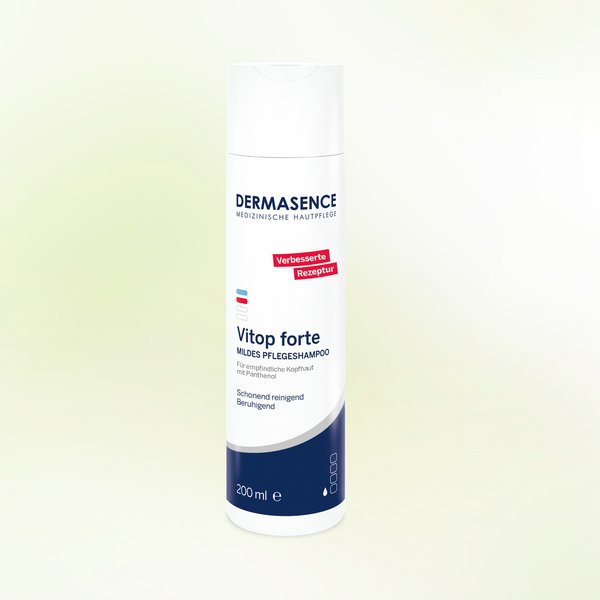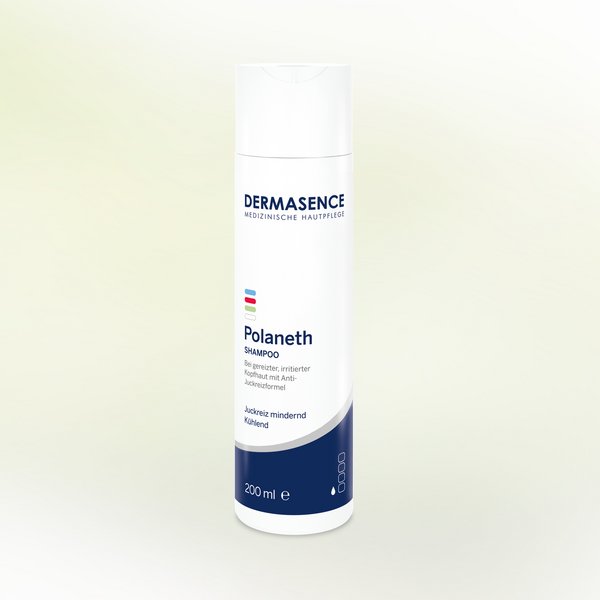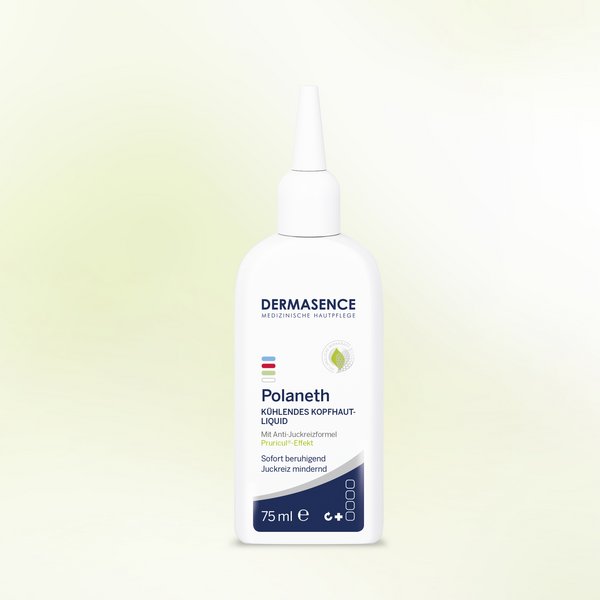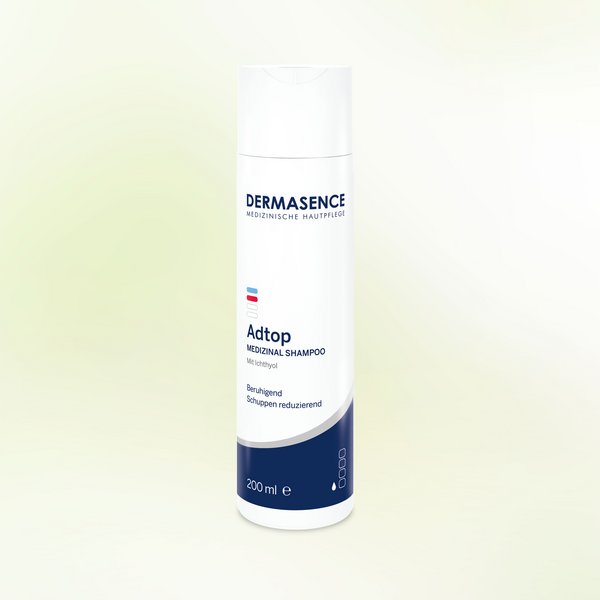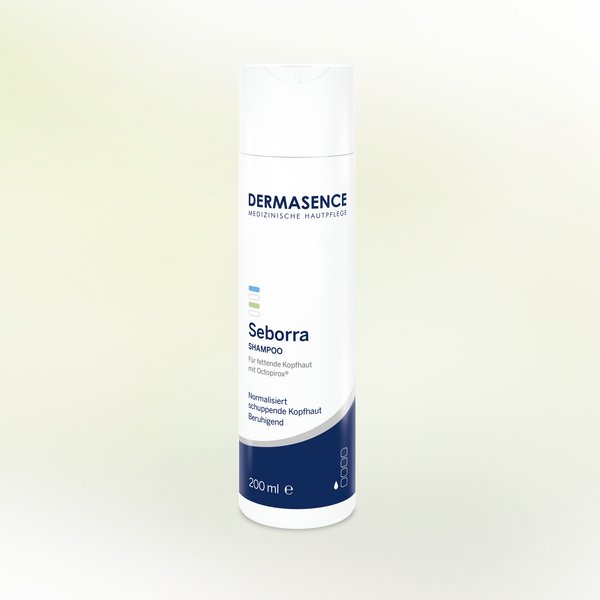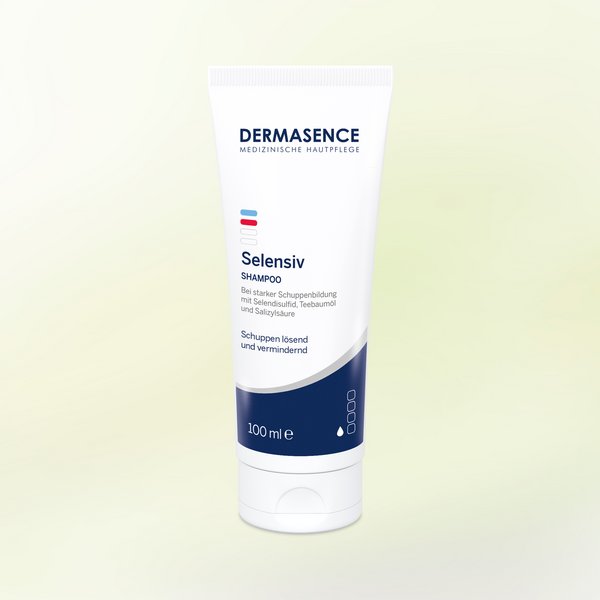
Scalp & Hair
Say goodbye to itchy, flaky and oily scalp
The healthy scalp as the basis for healthy hair
A balanced, healthy scalp is the most important prerequisite for shiny, healthy hair. Its health is mainly influenced by the composition of sweat and sebum and the speed of skin renewal.
However, what happens when the scalp itches, flakes or is excessively oily? The stress for those affected is great and it is advisable to go to a dermatologist's office: dermatologists can quickly determine the causes of scalp problems. Scalp problems can often be traced back to individual care and styling behaviour, but diseases can also be a trigger.
The typical diseases that also affect the scalp include:
- Psoriasis
- Neurodermatitis (Atopic Dermatitis)
- Seborrhoeic dermatitis
Whatever the cause, they weaken skin health and can also make hair look dull, dry and brittle.
From severe dandruff to sensitive, dry scalp to severe itching: As a specialist in medical skin care, at DERMASENCE you will find both shampoos that are suitable for cleansing and caring for a healthy scalp, as well as products that you can use to accompany therapy for challenging scalp problems.

Numerous nerves end on the scalp. Das Empfinden von Juckreiz (Pruritus) kann dort daher besonders stark ausgeprägt sein. Often, an itchy scalp is due to a barrier disorder of the skin. It hinders the skin in its protective function, so that pathogens have an easy game and can trigger infections. Kratzen reinforces the vicious circle.
The list of possible causes for itching is long. Depending on the trigger, there are also different therapeutic options. We therefore recommend that those affected always seek medical advice and have disease-related causes (e.g. psoriasis or neurodermatitis) ruled out.
In addition to the above, the following factors can also lead to an itchy scalp:
- Hormonal changes
- Taking medication
- Parasitic colonisation (e.g. head lice)
- Sunburn
- Malnutrition
Medicinal anti-itch shampoos and care products from the pharmacy soothe the skin immediately and reduce itching for a long time. They strengthen the skin barrier and stimulate the skin's own regeneration process.

Dandruff and flaky scalp
Healthy skin renews itself approximately every 28 days. This is a normal process that also takes place on the scalp. Tiny, dead skin cells (corneocytes) are detached from the top layer of skin (epidermis) so that new skin cells can grow. If this process accelerates, dandruff can develop. Depending on the skin type and the number of skin cells, they condense into greasy or dry cell clumps that are visible as white to yellowish dandruff in the hair.
In many cases, dandruff is harmless and can be promptly and visibly contained with the appropriate shampoo or care product. However, dandruff can also be a symptom of a disease and should therefore be clarified dermatologically.
Dry dandruff
Pityriasis simplex capillitii, Pityriasis capitis
Dry dandruff occurs on a scalp that produces toolittle sebum (sebostasis). They are usually white/silvery and also trickle onto the shoulders. Dry dandruff occurs when the skin renewal rate is between 7 and 21 days.
A scale consists of a compound of 100-1,000 cells. Smaller, so-called flour scales consisting of cell clusters of 10-20 cells are hardly visible to the eye.
Causes of dry dandruff: including degreasing shampoos, frequent hair washing, contact allergy, climate, skin diseases (psoriasis capitis and atopic dermatitis).
Dermatological shampoos loosen dandruff, strengthen the skin barrier and provide the scalp with moisture and nourishing substances such as panthenol and allantoin..
Greasy dandruff
Pityriasis steatoides capitis
Oily dandruff is caused by increased sebum secretion on the scalp (seborrhoea). Compared to dry dandruff, these stick more firmly to the hair, tend to be larger and can have a yellowish hue. Oily dandruff also often occurs at the hairline of the forehead and on the eyebrows.
Causes of greasy dandruff: lack of cleanliness, colonisation with the yeast fungus Malassezia furfur (outdated also Pityrosporum ovale), skin diseases (seborrhoeic scalp eczema), among others.
Medicinal shampoos for oily scalps normalise sebum production and soothe the skin, e.g. with menthol. Depending on the cause and accompanying symptoms, anti-fungal, itch-relieving active ingredients are effective.
Description: Visible dry scales with cell clusters of between 100 and 1,000 corneocytes. Due to damage to the skin barrier and the associated tiny inflammation foci, there is often excruciating itching and redness. Frequent hair washing aggravates the symptoms.
Development: The dry scalp is caused by a disturbance of the hydrolipid film, which alters the composition of the microflora. The result isMicro-inflammatory foci of the scalp that are not firmly localised and that trigger desquamation.
Treatment: Can usually be done at home. Shampoos that regulate the pH value, have an anti-inflammatory effect and soothe the skin are recommended..
Product recommendations:
- Focus dandruff: DERMASENCE Adtop Medicinal Shampoo
- Focus itching: DERMASENCE Vitop forte Mild care shampoo
Description: Very common skin disease that mainly affects middle-aged men. The skin disease manifests itself as yellowish, greasy dandruff that forms on the scalp, among other places. Seborrhoeic dermatitis is not contagious.
Cause: not conclusively clarified. Besides genetic and other factors, certain yeast fungi are the focus of research.
Development: The male sex hormone androgen causes increased sebum production.
Treatment: Depending on the severity, the use of antifungal agents or cortisone preparations is possible. Furthermore, shampoos for the scalp area are a good support for medical therapy. Products with Octopirox, Selenium disulphide and Tea tree oil, as they have fungicidal (anti-fungal) and anti-dandruff effects.In most cases, the skin areas normalise quite quickly under therapy. However, seborrhoeic eczema often recurs after discontinuation of the preparations or generally runs a chronic course.
Product recommendations:
- Focus greasy dandruff: DERMASENCE Seborra Shampoo
- Focus plaques: DERMASENCE Selensiv Shampoo
- Focus intense itching: DERMASENCE Polaneth Shampoo and/or DERMASENCE Polaneth Cooling scalp liquid
Description: Dry scaling associated with an irritated, itchy and inflamed scalp. As is typical for neurodermatitis, the eczema occurs in episodes.
Cause: Genetic predisposition, but the manifestation depends on a variety of factors (allergies, colonisation of the skin with bacteria, psychological factors, ...).
Treatment: For adult atopics, anti-dandruff preparations such as oils containing salicylic acid can be used for a short time. Mild shampoos and scalp tonics are used to support the treatment. The aim is to calm the skin and prolong relapse-free phases.
Product recommendations:
- Focus on sensitive scalp: DERMASENCE Vitop forte Mild care shampoo
- Focus on severe itching: DERMASENCE Polaneth shampoo and/or DERMASENCE Polaneth Cooling scalp liquid
Description: Psoriasis vulgaris is an autoimmune disease that is limited to the scalp only in exceptional cases and is sometimes difficult to distinguish from seborrhoeic eczema. The hairy head shows sharply defined and reddened, sometimes slightly raised plaques (accumulation of skin scales) with adherent, silvery, shiny scaling. In psoriasis, cell renewal is greatly accelerated..
Treatment: The treatment has many options and belongs in the hands of a specialist. Accompanying therapy, shampoos with Salicylic acid, Selenium disulphide, Ichthyol bright and tea tree oil can be used to loosen the stubborn plaques in the head area. The increased formation of horny cells and increased sebum flow is thus regulated and a colonisation of the scalp with bacteria and fungi is counteracted.
Product recommendations:
- Cure application: DERMASENCE Selensiv shampoo, supplementary DERMASENCE Vitop forte Mild care shampoo
- Focus severe itching: DERMASENCE Polaneth shampoo and/or DERMASENCE Polaneth Cooling scalp liquid,
- Focus sensitive scalp: DERMASENCE Adtop Medicinal shampoo

People with a very oily scalp suffer from overactivity of the sebaceous glands (seborrhoea), so that they secrete more sebum than usual. Sebum is a secretion that consists mainly of fatty acids and proteins. It is an important component of the protective acid mantle (hydrolipid film), which protects the skin from external influences such as pathogenic germs and fungi. In addition, sebum keeps the hair supple and hard-wearing.
If the structure of the acid mantle is shifted due to excess sebum, this is often accompanied by a shift in the pH value and a disturbed skin barrier. Thus, it is not uncommon for itching to occur with an oily scalp. The excessive production of sebum leads to a visibly greasy hairline and stringy hair with speckly sheen. This is quickly perceived as unkempt.
Although a lack of hygiene can lead to greasy hair, the following causes are much more common:
- Changes in hormone levels (especially during puberty and pregnancy, but also due to stress or medication).
- Genetic predisposition
- Too frequent hair washes, heavy styling or wrong care products.
Dermatological shampoos against oily scalp aim to normalise sebum production and cool the scalp, for example with menthol.


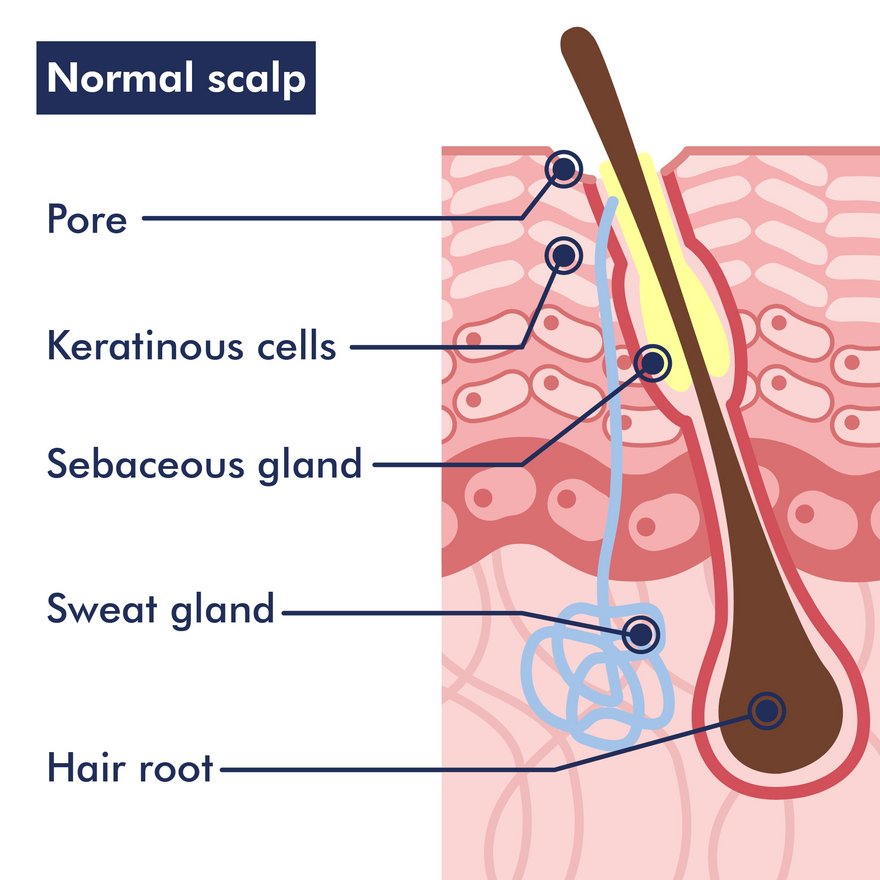
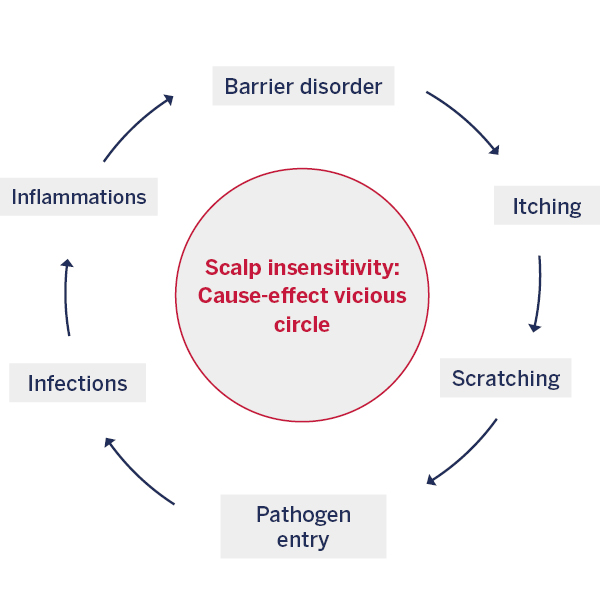
![[Translate to Englisch:] Kopfhaut mit trockenen Schuppen [Translate to Englisch:] Kopfhaut mit trockenen Schuppen](https://www.dermasence.com/fileadmin/Media/Common/Media/02_Meine_Haut/03_Spezielle_Pflege/Kopfhaut_Haare/DS-HP-Kopfhaut-Haare_schuppige-trockene-kopfhaut-content.jpg)
![[Translate to Englisch:] Kopfhaut mit fettigen Schuppen [Translate to Englisch:] Kopfhaut mit fettigen Schuppen](https://www.dermasence.com/fileadmin/Media/Common/Media/02_Meine_Haut/03_Spezielle_Pflege/Kopfhaut_Haare/DS-HP-Kopfhaut-Haare_fettige-schuppen-content.jpg)
![[Translate to Englisch:] Kopfhaut mit fettigen Haaren [Translate to Englisch:] Kopfhaut mit fettigen Haaren](https://www.dermasence.com/fileadmin/Media/Common/Media/02_Meine_Haut/03_Spezielle_Pflege/Kopfhaut_Haare/DS-HP-Kopfhaut-Haare_fettiger-haaransatz-content_1.jpg)
